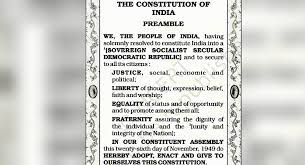Socialist and Secular in Preamble

- 27 Nov 2024
In News:
Supreme Court upholds ‘secular, socialist’ in Preamble of the Constitution.
Key Highlights of the Supreme Court Judgment
- Judgment Overview:
- Supreme Court's Ruling: The Court upheld the inclusion of the terms ‘socialist’ and ‘secular’ in the Preamble of the Indian Constitution through the 42nd Amendment Act of 1976.
- Challenge: Petitioners, including BJP leader Subramanian Swamy, challenged the retrospective application of these terms, arguing they were not part of the original Preamble adopted in 1949.
- Court's Explanation:
- Socialist: The term represents a welfare state aimed at reducing inequality and ensuring social, political, and economic justice, but does not prescribe a specific economic policy (left or right).
- Secular: Denotes a state that treats all religions equally, ensuring religious freedom and neutrality in religious matters. It is linked to Articles 14, 15, and 16, which ensure equality and non-discrimination.
- Retrospective Application:The Court affirmed that Parliament’s amendment power under Article 368 extends to the Preamble, and the retrospective application of the terms was valid.
- Constitution as a ‘Living Document’:The Court emphasized that the Constitution is adaptable to societal changes and evolving needs. The inclusion of 'secular' and 'socialist' reflects India’s evolving democratic and social framework.
- Interpretation of Secularism and Socialism:
- Secularism in India refers to the state's neutral stance towards all religions, promoting religious harmony.
- Socialism signifies India’s commitment to ensuring equality of opportunity and promoting welfare policies, such as social justice and economic welfare.
Constitutional and Legal Framework
- Article 368: Grants Parliament the authority to amend the Constitution, including the Preamble. The Court affirmed that this power is unquestionable.
- Kesavananda Bharati Case (1973): Established the ‘basic structure doctrine,’ which means certain fundamental features of the Constitution cannot be altered. The inclusion of ‘secular’ and ‘socialist’ is in line with this basic structure.
- S.R. Bommai Case (1994): Reinforced the secular nature of the Indian state.
Preamble to the Constitution
- Definition: The Preamble is an introductory statement that outlines the fundamental values and goals of the Indian Constitution.
- Key Objectives: Justice (social, economic, political), Liberty (thought, expression, belief), Equality (status and opportunity), and Fraternity (national unity and dignity).
- Terms in the Preamble:
- Sovereign: India's independence in all matters.
- Socialist: Commitment to social justice and welfare.
- Secular: Equal respect for all religions.
- Democratic: Governance by the people, through elected representatives.
- Republic: Head of state elected, not hereditary.
42nd Amendment Act, 1976:
- Context: Introduced during the Emergency under Indira Gandhi's government.
- Key Changes: Added 'socialist' and 'secular' to the Preamble, revised 'Unity of the Nation' to 'Unity and Integrity of the Nation.'
- Significance: Strengthened constitutional values like inclusivity, equality, and justice.
Socialist and Secular Initiatives by Government
- Socialist Programs:
- MGNREGA: Rural employment guarantee.
- PDS: Food security system.
- Right to Education (RTE): Free, compulsory education.
- Housing Schemes: Awas Yojana for the economically weaker sections.
- Secular Programs:
- Minority Welfare: Scholarships and skill development.
- Religious Protection Laws: Protection of places of worship.
- Communal Violence Laws: Special courts for violence-related cases.
- Constitutional Safeguards: Equal rights for all religions under Articles 25-28.
Significance of the Supreme Court Judgment
- Reaffirmation of Constitutional Values: The inclusion of ‘socialist’ and ‘secular’ reinforces India’s commitment to equality, justice, and democratic principles.
- Legitimacy of Amendments: Affirms Parliament's constitutional power to amend the Preamble.
- Evolving Interpretation: Recognizes that the Constitution must evolve in response to societal and political changes.
